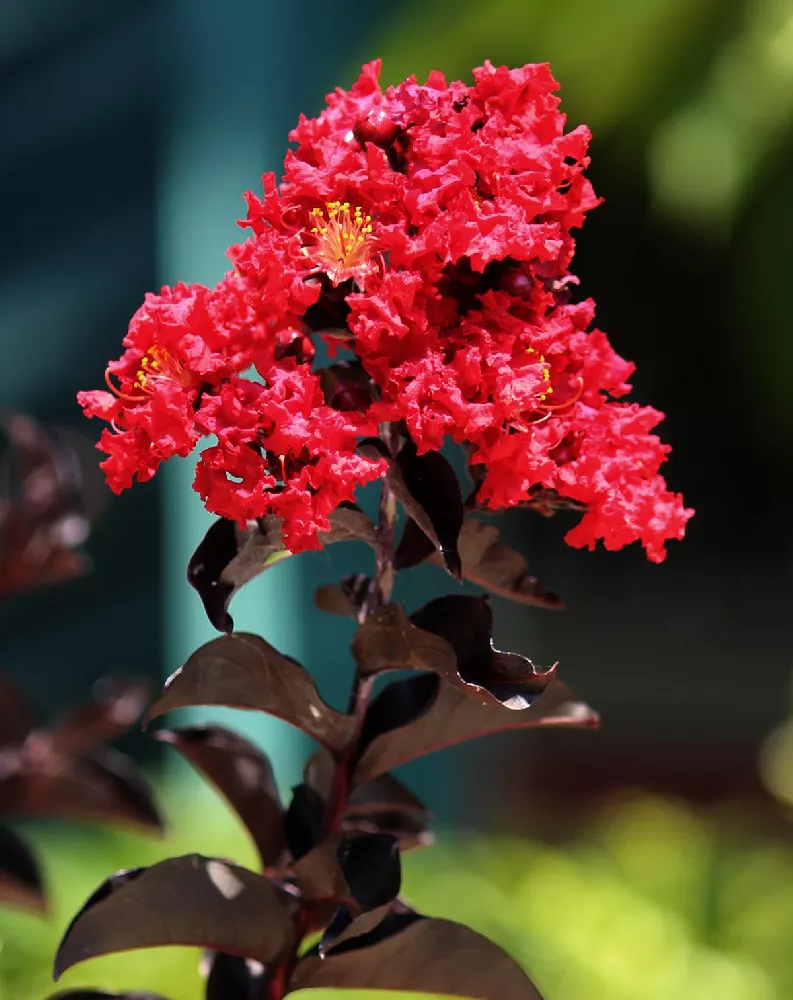- Home >
- Flowers >
- Trees and Plants with Red Flowers >
- Colorama™ Scarlet Crape Myrtle Tree
Colorama™ Scarlet Crape Myrtle Tree for Sale - Buying & Growing Guide
- Ships in 1-2 days
- 1-Year Warranty Eligible
- Pots or accessories are not included unless specified in the product options.
Shipping Details:
Once your order is shipped, you’ll receive an email with a tracking number and estimated delivery date. Most orders ship immediately, but some items are seasonal and may only ship in spring or fall. These products are noted on the website.
If you're searching for an easy-care plant that offers a great return on your investment, look no further. The Colorama™ Scarlet Crape Myrtle, Lagerstroemia x 'JM1' PPAF, is just the plant to turn your head. From the beginning of summer until your first fall frost, this handsome cultivar is covered in blooms that are a deep vibrant red, which contrast with the tree's deep green foliage. Even after the blooms fade, these crape myrtles still deliver with appealing mottled bark in shades of brown and gray that offer winter interest in the garden. The Colorama™ Scarlet Crape Myrtle is hardy all the way up to USDA hardiness zone six, which means it can be grown in areas that are off-limits to most of these heat-loving plants. Here are three more reasons to grab one for your garden today:
- This fast-growing cultivar reaches its mature size within a few years.
- Drought-tolerant and needs only occasional supplemental watering.
- Its compact size makes it useful in small gardens.
Plant Care
Sunlight

The Colorama™ Scarlet Crape Myrtle thrives in full sun, six or more hours of direct sunlight a day.
Watering
Once established, the Colorama™ Scarlet Crape Myrtle should be watered every seven to ten days.
Fertilizing

Feed your crape myrtle with a slow-release, balanced fertilizer in late winter or early spring.
Planting and Care
Planting instructions
Site your Colorama™ Scarlet Crape Myrtle where it will receive at least six hours of sunlight daily. Unpot your tree and tease out any encircling roots, which can wrap around the root ball and slowly kill the tree. Dig a hole that’s as deep as the root ball and twice as wide. Place the tree in the hole, spreading out the roots. Holding it upright and steady, fill in around the roots with topsoil, tamping down as you go to eliminate air pockets. Water thoroughly. Apply a two to three-inch layer of organic mulch such as bark chips around the root zone to conserve moisture and hinder weed growth but keep it from touching the trunk to avoid problems with rot.
Watering and nutrients
For the first few weeks after planting, water your crape myrtle every other day unless it’s very hot or dry outside, in which case water it daily. Once you see robust new growth appearing on the branches, you can start to scale back on the watering. A mature tree will need water from rain or supplemental watering every seven to ten days. Fertilize in early spring with a slow-release, balanced fertilizer designed for landscape trees and shrubs.
Pollination
Crape myrtle flowers are self-fertile, meaning they have both male and female reproductive organs. They are easily pollinated by the many insects, such as bees and butterflies, that are drawn to vibrant flowers. A pollinated flower leads to small seed pods in the fall.
Pruning
Prune out any dead, diseased or damaged branches whenever you see them on your crape myrtle. This tree doesn’t need additional regular pruning, but you can shape it lightly in early spring if you wish to control its height or form.
Pests, diseases, and animals
Insect pests that may appear on your Colorama™ Scarlet Crape Myrtle include crape myrtle aphids, Japanese beetles and scale insects. A healthy tree is often able to fight off infestations with no help. Releasing beneficial predatory insects such as ladybugs and lacewings can also help control insect populations. Diseases that occasionally occur on crape myrtles include powdery mildew, a fungal disease that can be controlled with the use of a fungicide and Cercospora leaf spot, which will also respond to fungicides.
Achieving maximum results
Knowing how to use the Colorama™ Scarlet Crape Myrtle in your landscape or garden is one way to achieve maximum results. As a showy ornamental tree, this cultivar would do well when planted in a visible location where it can be admired when in bloom. It can be used, for example, as a foundation planting, although keep in mind that it can reach a height of up to 20 feet and a width of 12 feet; so, space it accordingly. A grouping of three or five on a large sloping front lawn, underplanted with shade-loving perennials such as astilbes and hostas, would be spectacular. They would also be a colorful backdrop in a deep bed of mixed flowering perennials and shrubs.
FAQs
Where can I grow the Colorama™ Scarlet Crape Myrtle
Although considered best suited for the South, the Colorama™ Scarlet Crape Myrtle is hardy all the way to USDA hardiness zone six. That means it will grow as far north as the Pacific Northwest and even into parts of Coastal New England. It can handle temperatures down to 0 degrees Fahrenheit and is hardy throughout even the semi-tropical areas of the South.
Are crape myrtles trees or shrubs?
They are considered multi-stemmed trees, and some grow as tall as 40 feet in height. The Colorama™ Scarlet Crape Myrtle, however, maxes out at a reasonable height of about 20 feet, with a mature width of 8 to 12 feet.
When is the best time to plant my crape myrtle?
The Colorama™ Scarlet Crape Myrtle is a sturdy plant that should do fine no matter when you plant it. If you live at the north end of its range, you'll want to avoid planting in the winter, when the ground is frozen. Near the southern end, spring is the best time, since it will be able to acclimate before the extreme temperatures of summer.










